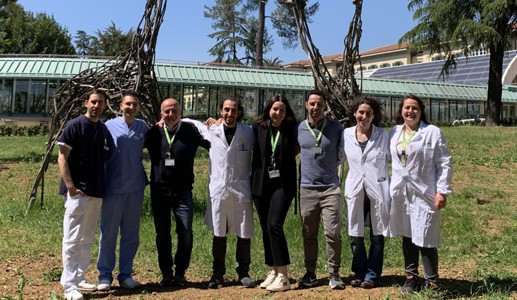Contact
Phone
+39 055 5662689
E-mail
This email address is being protected from spambots. You need JavaScript enabled to view it.
 ERGOMeyer is a Strategic Operational Unit for Human Factors and Ergonomics developed at Meyer Children's Hospital. The group’s objective is to improve the working environments of operators and inpatient care of children and families by actively supporting and training healthcare personnel for the safety and quality of care of pediatric patients. The unit supports Clinical Risk and Pediatric Simulation for Risk Management.
ERGOMeyer is a Strategic Operational Unit for Human Factors and Ergonomics developed at Meyer Children's Hospital. The group’s objective is to improve the working environments of operators and inpatient care of children and families by actively supporting and training healthcare personnel for the safety and quality of care of pediatric patients. The unit supports Clinical Risk and Pediatric Simulation for Risk Management.
What is Ergonomics?
When we talk about ergonomics we often think of chairs, kitchen knives or office desks, focusing on the physical and anthropometric component alone. To define a product or service as ergonomic, however, it should consider all the components inherent to Human Factors: physical, cognitive and organizational.
The term Ergonomics comes from the Greek érgon (work) and ńomos (law), used to define the science of work and formalized in the late 1940s to explain human error, safety and the efficiency of workers, is now used in its widest meaning.
Ergonomics (or human factors) is the scientific discipline concerned with the understanding of interactions among humans and other elements of a system, and the profession that applies theory, principles, data, and methods to design in order to optimize human well-being and overall system performance. The terms ergonomics and human factors are often used interchangeably or as a unit (e.g. human factors/ergonomics – HF/E or E/HF), a practice that is adopted by the IEA.
Through the evaluation of human factors in the physical, cognitive and organizational components, it aims to promote human well-being and performance in the living and working environments, identifying all the tools that prevent errors and promote personal skills.
The ergonomist applies the knowledge, methods and tools from different disciplines (biomedical, psychosocial, and polytechnic), analyzing and evaluating processes and systems to improve the interaction between products, services, environments and human needs of a psycho-physical and social nature. These professionals apply their expertise to their work with a systemic and multidisciplinary approach.
What does ERGOMeyer offer patients and healthcare workers?
ERGOMeyer supports Healthcare Workers, patients and relatives to improve environments, tools, equipment, and devices in all stages of development and implementation.
The wellbeing of the healthcare worker is essential for improving the safety and quality of patient care, and needs suitable tools for analysis and ergonomic intervention that, with regard to human factors, facilitate the right actions and do not allow the wrong ones.
It is implemented through a systemic and interdisciplinary approach, coordinated by the ERGOMeyer Team, which is composed of specialists from different disciplines (medicine, nursing, psychology, architecture, engineering, communication, etc.) and through services for operators (ERGOSIM, ERGO on Demand, ERGOSafe). It offers training support to healthcare and non-healthcare workers and students in understanding ergonomics and human factors.
ERGOSIM Ergonomics and simulation for the correct design, implementation, organization and layout of spaces.
ERGO on Demand Ergonomics to support operators and services in the need for ergonomic assessment and intervention.
ERGOSafe Ergonomics and risk management, activated by the Clinical Risk Manager (CRM) following adverse events or critical issues identified.
- Gabriele Frangioni, Ergonomist Architect
- Marco de Luca, Physician
- Eustachio Parente, Nurse
- Matteo Pirinu, Physiotherapist
- Lorenzo Tacchini, IT Technician
- Laura Vagnoli, Psychologist
- Valentina Vizzarro, Biomedical Engineer
- Giulia Bazzani, Psychologist
- Giovanni Grazi, Civil Engineer
- Paola Tonietti, Nursing Coordinator
- (2023) ERGOMeyer for Patient Safety and Quality of Care: Ergonomics in a Children’s Hospital
- (2023) Nudging for Hand Hygiene
- (2023) Interruptions during therapy preparation, administration and monitoring while caring for the paediatric population: a scoping review
- (2018) Ergonomics in Hospital: Prevention of Interruptions and Safety in Drug Administration
Content manager: Gabriele Frangioni
